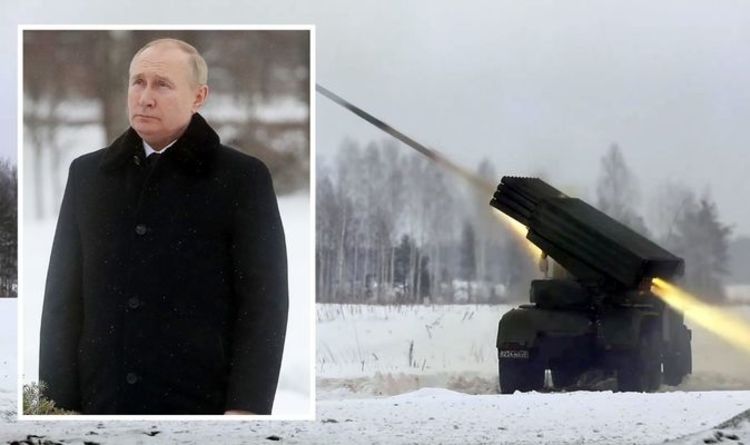Russia: Reaction 'stronger than Putin expected' says Ricketts
We use your sign-up to provide content in ways you’ve consented to and to improve our understanding of you. This may include adverts from us and 3rd parties based on our understanding. You can unsubscribe at any time. More info
Boris Johnson was forced to cancel a planned phone call with President Putin on Monday afternoon after the release of Sue Gray’s report. The Prime Minister was scheduled to speak to the Russian president at 4pm amid growing tensions between the Kremlin and Ukraine. He is due to visit the region on Tuesday, and said any invasion of Ukraine would be “an absolute disaster for the world but above all it would be a disaster for Russia”. Foreign Secretary Liz Truss confirmed the UK will be toughening and expanding its sanctions regime in response to Russian aggression against Ukraine.
She warned: “There will be nowhere to hide. Nothing is off the table.”
Putin has continually denied planning to attack Ukraine, despite a mounting presence on the border, and is demanding NATO promises to never let Kiev join the alliance.
Around 120,000 Russian troops, tanks, artillery and missiles are currently placed near Ukraine’s border.
Russia has also brought in supplies of blood, which would allow them to treat casualties. Reuters news agency reports this is another key indicator that Moscow is preparing an invasion.
Mr Putin has flexed Russian muscles on a frequent basis since being elected in 2012.


In a 2013 speech, he urged military chiefs that a “drastic upgrade” to Russia’s armed forces was needed to counter numerous external threats.
The speech was “probably not intended for a foreign audience”, according to The Monitor’s Moscow correspondent Fred Wise.
The remarks, however, were posted on the Kremlin website.
Mr Putin urged: “The changing geopolitical situation requires rapid and considered action.
“Russia’s Armed Forces must reach a fundamentally new capability level within the next three to five years.

“We see how instability and conflict are spreading around the world today.
“Armed conflict continues in the Middle East and Asia, and the danger of ‘export’ of radicalism and chaos continues to grow in our neighbouring regions.”
Moscow remains keen to ensure political instability seen in countries such as Afghanistan does not spill over into former Soviet republics.
Central Asian countries, including Armenia, Belarus and Kyrgyzstan, remain strong Russian allies.
Mr Putin’s speech also took a swipe at the US. He continued: “At the same time, we see methodical attempts to undermine the strategic balance in various ways and forms.
DON’T MISS:
Russia sends blood supplies to Ukraine border in ominous sign [REPORT]
Germany’s is a laughing stock as Putin rubs his hands with glee [QUOTES]
Russia’s ‘unrivalled’ missile defence system ‘completed’ [REVEALED]

“The United States has essentially launched now the second phase in its global missile defence system.
“There are attempts to sound out possibilities for expanding NATO further eastward, and there is also the danger of militarisation in the Arctic.”
The Russian military has been overhauled under Mr Putin’s leadership.
In stark contrast to years gone by, Russia boasts a modern, sophisticated army with a much better structure in place.
It has become a key part of Mr Putin’s foreign policy, and Russian capabilities were all too evident when they intervened in Syria in 2015.

Lt. Gen. Ben Hodges, former commander of the US Army in Europe, told the New York Times last week: “I’m embarrassed to admit, I was surprised a few years ago when Kalibr missiles came flying out of the Caspian Sea, hitting targets in Syria.
“That was a surprise to me, not only the capability, but I didn’t even know they were there.”
Ultimately, the West has been forced to stand up and listen to Russia.
Last week, a comment piece in the New York Times said: “Without firing a shot, Mr Putin has forced the Biden administration to shelve other foreign policy priorities and contend with Kremlin grievances the White House has long dismissed — in particular reversing Ukraine’s Westward lean in the post-Soviet period.”
President Biden insisted yesterday that the US is “ready no matter what happens” in Ukraine.
Mathieu Boulègue, research fellow in the Russia and Eurasia program at Chatham House, told the New York Times that there is very little the West can do to prevent Mr Putin from attacking Ukraine if he wishes to do so.
He told the newspaper: “There’s very little we can do to deny Russia’s ability to wage further warfare against Ukraine.
“We can’t deter a worldview.”
Source: Read Full Article
